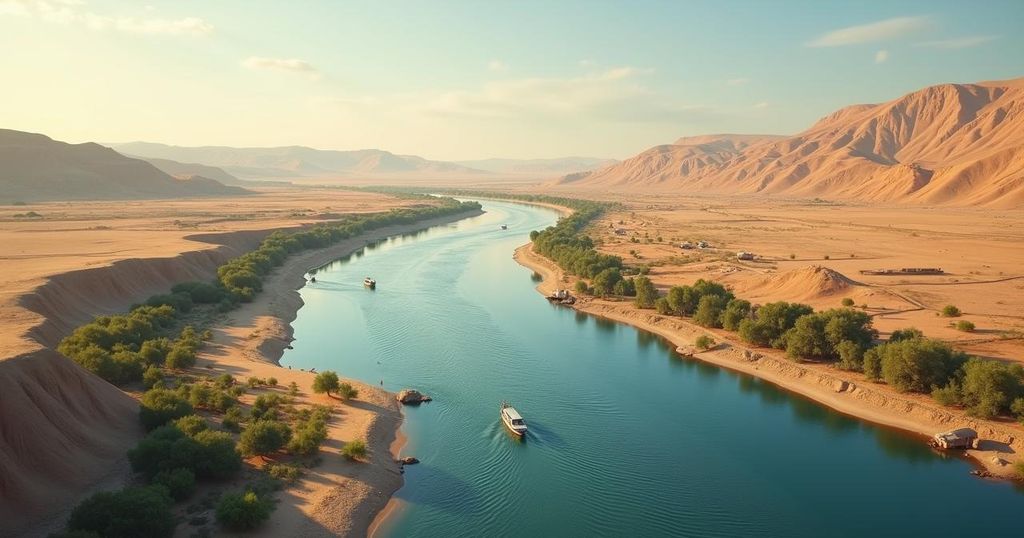On October 13, Egypt and Sudan rejected the Nile River Basin Cooperative Framework Agreement (CFA) that was enacted after ratification by six upstream countries. The two nations emphasized the importance of respecting historical water agreements and called for inclusive dialogue among Nile Basin states to maintain equitable cooperation. Their statement reflects longstanding concerns regarding the CFA’s compliance with international law and its implications for upstream-downstream relationships.
Egypt and Sudan have formally rejected the newly ratified Nile River Basin Cooperative Framework Agreement (CFA), which took effect on October 13 after six upstream countries ratified it. Following a recent meeting on October 11-12 in Cairo, representatives from Egypt and Sudan issued a joint statement urging all Nile Basin nations to respect the integrity of the original 1999 Nile Basin Initiative, warning against actions that could further divide upstream and downstream countries in the basin. The joint statement emphasized that the commission comprising the six states formed under the incomplete draft of the CFA cannot adequately represent the interests of the entire Nile Basin. Egypt and Sudan’s longstanding position contends that the CFA undermines the frameworks established by the 1929 and 1959 Nile River Agreements, which solidify their rights to the river’s waters. Furthermore, they cite a 1989 International Court of Justice ruling asserting that water agreements possess the same inalterability as border agreements, indicating that they cannot be revised unilaterally. The Permanent Joint Technical Commission (PJTC) reiterated that the 2010 draft of the CFA failed to achieve the requisite consensus and does not adhere to recognized international law principles that facilitate sustainable development and international cooperation. The Commission underscored the necessity for prior notifications, consultations, and scientific evaluations concerning water projects, advocating for a collaborative approach to managing resources in the Nile Basin. Additionally, Egypt and Sudan maintain their commitment to work with all Basin countries within the framework of international norms, hoping to establish an inclusive environment conducive to comprehensive cooperation. They specifically called for restoring inclusivity within the Nile Basin Initiative to foster cooperation among all stakeholders. The CFA, now effective, was ratified earlier this year by six downstream nations—Ethiopia, Kenya, Tanzania, Rwanda, Burundi, and Uganda—and seeks to establish the Nile River Basin Commission (RNBC), which aims to assume the rights and responsibilities of the previous Nile Basin Initiative established in 1999. Notably, tensions surfaced when the second summit intended to celebrate the transition from the NBI to the RNBC was recently canceled. Historically, the management of the Nile has been largely governed by treaties from 1929 and 1959, which favor Egypt and Sudan, granting Egypt the majority share of the river’s waters at 75%. Efforts to reframe the management of Nile resources began with the Nile Basin Initiative in 2010, culminating in the creation of the CFA, which has faced consistent opposition from Egypt and Sudan, leading to its rejection in the current context.
The Nile River, one of the world’s longest rivers, is a vital source of water for several countries in East Africa, particularly Egypt and Sudan, which are located downstream. Historical treaties from 1929 and 1959 have largely dictated water rights, favoring these two nations by assigning them the majority of the river’s water resources. The need for a more equitable agreement has led to the drafting of the Nile Basin Initiative in 1999 and the recent Cooperative Framework Agreement (CFA) in 2010. However, the CFA’s ratification by upstream countries has sparked tensions and highlighted ongoing disputes regarding water rights and utilization among Nile Basin countries.
Egypt and Sudan’s rejection of the CFA emphasizes the ongoing disputes over Nile water rights and the complexities of achieving cooperative water management in the region. Their call for a return to a more inclusive approach underscores a commitment to dialogue and collaboration that respects the historical agreements that currently govern water use in the Nile Basin. As tensions persist, the future of Nile cooperation hangs in the balance, necessitating a delicate balance of interests among all nations involved.
Original Source: www.agenzianova.com







